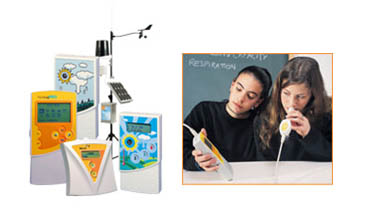Consider taking your lab outside! In this setting a student can observe, with his or her senses, the changes in wind speed, the humidity in the air, smells, sounds, and even relative temperature; in short, the student can observe data around them. Data gathered in this manner has lead to the development of important scientific theories and breakthroughs. For students, however, it may be difficult to interpret this data into meaningful scientific language or an analyzed finished product.
When students are asked to observe the same outdoor setting, this time with data-logging equipment, the variety of sensors is increased ten-fold. When the student senses the change in wind speed, they will at the same time be capable of quantitatively measuring the speed and recording the changes over time. Data collection of this nature allows the student to see the scientific aspects of what is occurring naturally around them. Data-logging equipment uses electronic devices to collect and record physical measurements. This data acquisition allows the students to rapidly record data that would otherwise take long periods of time to document. The increase in sensory perception and the ability to collect large amounts of data and display it graphically afford the student the opportunity to interpret and understand scientific concepts in a new and advanced way. It is this interpretation that allows the next step in a scientific understanding of the world around us and adds tools to the Predict, Observe, and Explain pedagogy.
Scientific data-logging is the collection and processing of numerical data using electronic devices. The two devices used are a sensor and a computer with an interface to correctly interpret and display the data collected. In this way, data-logging is not a method for teaching science but a means to teach scientific curriculum.
Fourier has developed a system for data-logging which spans the breadth of age groups and curriculums. From advanced systems like the Nova5000, to the MultilogPro and the ultra portable Ecolog XL. Portability is a key feature with this data-logging system. Students can pick up and move to their experiment, to experiments that are already taking place in the environment, or between experiments to collect key data at key times. Data-logging also allows students to re-prioritize their time. Recording data manually is time consuming and labour intensive. With the Fourier equipment, for example, the system will record the data for the student, eliminating the mundane recording, plotting and tabulation of information. This leaves the students time for analysis and discussion of data. The student can now focus on the thinking; the explanation of why certain things happen certain ways.
Never has a system been so science ready as this single solution example from Fourier. Now schools can benefit from fully mobilized, computerized science laboratories that students can move, manipulate, and actually experiment with.
Author: Matthew Colbeck
Share this Post


